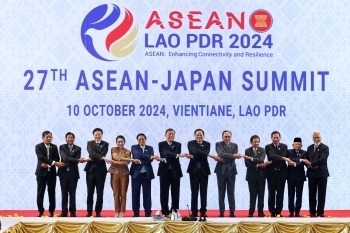
ICAS Bulletin (online ISSN 2836-3418, print ISSN 2836-340X) is published every other week throughout the year at 1919 M St NW, Suite 310, Washington, DC 20036.
The online version of ICAS Bulletin can be found at chinaus-icas.org/bulletins/.

– Russia and China blocked a proposed statement by ASEAN at the October 11 East Asia Summit due to language used on the South China Sea. The summit in Laos highlighted disagreements over the UN Convention on the Law of the Sea, with the U.S. and several other Western nations backing the proposed consensus statement for the East Asia Summit.
– U.S. Secretary of State Antony Blinken, who visited Laos for two days to participate in the 12th ASEAN-U.S. Summit, warned ASEAN leaders of China’s “dangerous” actions in the South China Sea. He reaffirmed U.S. support for freedom of navigation, while China blamed the U.S. military presence for instability.
– China successfully signed several new trade deals with ASEAN and ASEAN nations, while the U.S. progressed a few major initiatives of their own with its ASEAN partners. Premier Li Qiang advanced economic ties as Blinken emphasized U.S. investments and security concerns.
– ASEAN leaders pressed China to respect international law after South China Sea clashes during the October 12 summit in Laos, with U.S. officials raising concerns over China’s aggressive actions. Chinese Premier Li Qiang blamed foreign interference, including from the U.S., and reaffirmed China’s sovereignty and economic ties with ASEAN.
Associated News References:
“US official accuses Russia and China of blocking Asia leaders’ statement,” Reuters, October 12
“Blinken tells ASEAN the US is worried about China’s dangerous’ actions in disputed sea.,” AP News, October 11
“China Seizes Initiative at Key Asian Summit Ahead of US Election,” Bloomberg, October 11
“China defiant over South China Sea skirmishes in ASEAN talks, blames meddling by foreign forces,” Voice of America, October 10

– In a letter delivered on October 18, U.S. lawmakers urged the Biden administration to block Huawei suppliers from accessing American chip making tools, citing national security concerns. They warned that Chinese firms linked to Huawei are using U.S. technology to bypass sanctions, calling for stricter export controls.
– Semiconductor company ASML expects a significant drop in China sales due to U.S. export restrictions on its chip making tools. The Dutch chip equipment maker forecasted China’s contribution to its revenue will fall to around 20% in 2025, down from 49% in early 2024.
– New reports say that Apple collaborated with Shenzhen-based automaker BYD on long-range battery technology for its now-canceled car project, with the partnership contributing to BYD’s current Blade battery system.
– Chemical manufacturer Lyten is investing over $1 billion to build a lithium-sulphur battery factory in Reno, Nevada by 2027. The technology aims to reduce U.S. reliance on China for critical metals, offering a cheaper and longer-lasting alternative to lithium-ion batteries.
– The Biden administration is considering imposing country-specific caps on AI chip sales, building on existing restrictions aimed at China. The potential limits would also target countries like the UAE and Saudi Arabia, as concerns over national security and AI technology being used for surveillance increase.
Associated News References:
“Huawei Suppliers Face US Lawmaker Effort to Block Chip Gear,” Bloomberg, October 17
“ASML just gave us a first glimpse into how U.S. chip export curbs will dent its China sales,” CNBC, October 16
“Apple Secretly Worked With China’s BYD on Long-Range EV Battery,” Bloomberg, October 16
“$1bn US battery plant plan ups ante in race to reduce reliance on China,” The Irish Times, October 15
“US Weighs Capping Exports of AI Chips From Nvidia and AMD to Some Countries,” Bloomberg, October 15

– A pair of U.S. and Canadian warships sailed through the Taiwan Strait on October 21, less than one week after China conducted a military exercise around Taiwan. Beijing condemning the transit as “disruptive” and the U.S. Navy emphasizing it as a routine mission for freedom of navigation.
– U.S. and Filipino troops began annual joint military exercises in the South China Sea, with the drills focusing on coastal defense.
– On October 14, as an apparent warning against “separatist acts” following Taiwanese President Lai Ching-te’s remarks on Taiwan’s National Day, China’s military conducted war games around the island of Taiwan, drawing condemnation from Taiwan and the U.S. The drills involved both warships and aircraft and were followed up two days later by another military drill conducted by China simulating a blockade of Taiwan. The U.S. condemned the exercise as provocative and destabilizing.
– The U.S. condemned China’s potential use of Taiwan’s October 10 National Day speech as a pretext for military pressure. A U.S. official emphasized that there is no justification for such coercive actions, which undermine cross-Strait stability.
Associated News References:
“US, Canadian navies sail through Taiwan Strait week after war games,” Reuters, October 21
“U.S. and Philippines launch war games as Taiwan detects record number of Chinese military aircraft around island,” CBS News, October 15
“China Targets Taiwan in Major Military Exercise, Pentagon Condemns ‘Irresponsible’ Action,” USNI News, October 14
“China ends war games around Taiwan, but leaves door open to more,” Reuters, October 14
“US says Taiwan speech no justification for China military pressure,” Reuters, October 9

– Chinese tech company DJI is suing the U.S. to be removed from the “Chinese military companies” list, claiming that such a designation has hurt its business since 2021. The company denies ties to the Chinese government and Uyghur surveillance allegations, which are the reasons given for it being designated.
– The U.S. sanctioned two Chinese companies on October 19 for aiding Russia in producing long-range attack drones used in Ukraine. The Treasury Department cited direct collaboration between Chinese firms and Russian defense companies, further straining U.S.-China relations.
– Washington-based McKinsey is overhauling its China operations, cutting 500 employees and reducing work with government-linked clients amid rising U.S.-China tensions.
– On October 16, China’s Cybersecurity Association called for a security review of products made by U.S. tech company Intel , alleging that they pose national security risks. The potential review could impact Intel’s revenue in China.
– New York-based IBM is investigating misconduct allegations against its China head, Chen Xudong, after claims of accepting gifts and leaking company information. The investigation follows broader challenges that IBM is facing in China amid the U.S.-China geopolitical tensions.
– The White House triggered an emergency response group to address Chinese cyber intrusions into U.S. telecom providers. Officials are concerned the hacks may have compromised wiretap systems used by law enforcement, marking a significant security threat.
– California-based company OpenAI revealed that a China-linked group attempted a phishing attack on its employees earlier this year. The attack, aimed at stealing sensitive information, was unsuccessful due to existing security controls.
Associated News References:
“Dronemaker Suing Defense Dept. After Being Labeled as “Chinese Military Company”,” Tech.co, October 21
“US imposes sanctions on Chinese companies accused of helping make Russian attack drones,” AP News, October 17
“McKinsey Revamps Its China Operations Amid New Risks,” The Wall Street Journal, October 17
“Chinese cyber association calls for review of Intel products sold in China,” Reuters, October 16
“IBM Investigates Allegations of Executive Misconduct in China,” Bloomberg, October 14
“White House activates emergency response to telecom hacks,” Politico Pro, October 11
“OpenAI Says China-Linked Group Tried to Phish Its Employees,” Bloomberg, October 9

– China is reportedly developing a low-cost radar system capable of detecting the U.S. F-22 Raptor stealth fighter, utilizing a single receiving antenna and the BeiDou satellite system. The radar reportedly uses a “blind detection” method to track stealth jets and can switch between various satellite systems for uninterrupted operation.
– Senator Marsha Blackburn targeted China in a new political ad, highlighting her anti-China stance, while her opponent Gloria Johnson focuses on lowering costs and fighting corporate influence.
– The U.S. says it plans to use tariffs and other measures to counter China’s overproduction in sectors like electric vehicles and semiconductors. White House official Daleep Singh warned that China’s subsidies and market dominance are undermining global competition.
– Pentagon Deputy Secretary Kathleen Hicks stressed at a public think tank event that China’s military expansion is the United States’ top challenge, urging reforms in innovation and accountability within the Defense Department. She also highlighted the United States’ strategic advantage in its global alliances.
Associated News References:
“China Says Developing Low-Cost Radar That Can Track US F-22 Stealth Fighter Jets,” The Defense Post, October 21
“Marsha Blackburn takes aim at China as U.S. Senate ad race heats up,” The Tennessean, October 17
“White House warns China using overproduction for global dominance,” Reuters, October 17
“Hicks: China Threat More Difficult for Public to “Understand than Ukraine, Middle East,” USNI News, October 17

“US: Attendees of US-China Green Energy Summit call for urgent action on climate change,” Newsflare, October 19
“IPhone 16 Sales Soar 20% in China Debut as Demand Returns,” Bloomberg, October 18
“White House warns China using overproduction for global dominance,” Reuters, October 17
“Giant Pandas From China Return to National Zoo in Washington, D.C.,” The New York Times, October 15
“One’s got a big appetite, the other’s a bit of an introvert. China’s new panda diplomats touch down in DC,” CNN, October 15
“Xi says China willing to be a partner, friend with the US,” Reuters, October 15
“US dollar climbs to 10-week peak; euro, China’s yuan fall,” Reuters, October 14
“China’s AI start-ups race to crack US market,” Financial Times, October 9
“Mexico takes the US side in potential trade battles with China and seeks to boost local content,” AP News, October 9
L.E.A.D. Legislative Brief: 118th Congress Pushing for Further Decoupling with China during the “China Week” as Election Approaches
By Yilun Zhang, Amanda Jin & Ao Gu
October 14, 2024
Introduction:
As Congress resumed from its summer recess and as the election approaches, U.S. lawmakers in early September introduced a wave of China-related legislative measures, which in large part followed its consistent trajectory of firmly pushing for further U.S.-China strategic competition and decoupling. During what was dubbed as “China Week,” the House passed more than 20 bills targeting China, with a particular focus on emerging and critical technologies. Additionally, efforts were also made to address China’s global influence and to reassert democratic values related to U.S. concerns about China. Nevertheless, as the 118th Congress enters its final stretch, lawmakers face limited time to advance these measures, while the upcoming election promises to shift key players and hence potentially impact the overall legislative stance on China.
In May 2023, the team at the Institute for China-America Studies (ICAS) launched the U.S.-China Legislative and Executive Actions Directory (L.E.A.D.) Project to track and summarize trending critical issues and developments on China, emanating from both the White House and Capitol Hill.
This is the fifth release of the Legislative Actions Directory and the second legislative release in 2024, summarizing recent U.S. legislative moves up to the October recess and with a special additional focus on the November congressional race.

On Saturday, October 19, Senior Fellow Sourabh Gupta was interviewed by South China Morning Post on Taiwan remaining a flashpoint no matter who wins the U.S. election.
On Monday, October 14, Senior Fellow Sourabh Gupta was interviewed by CGTN America’s The Heat on the ASEAN Summit.
On Thursday, October 10, Senior Fellow Sourabh Gupta was interviewed by South China Morning Post on U.S.-China competition in advanced tech and what lies ahead.


The Institute for China-America Studies is an independent nonprofit, nonpartisan research organization dedicated to strengthening the understanding of U.S.-China relations through expert analysis and practical policy solutions.
1919 M St. NW Suite 310,
Washington, DC 20036
icas@chinaus-icas.org
(202) 968-0595
© 2025 INSTITUTE FOR CHINA-AMERICA STUDIES. ALL RIGHTS RESERVED.